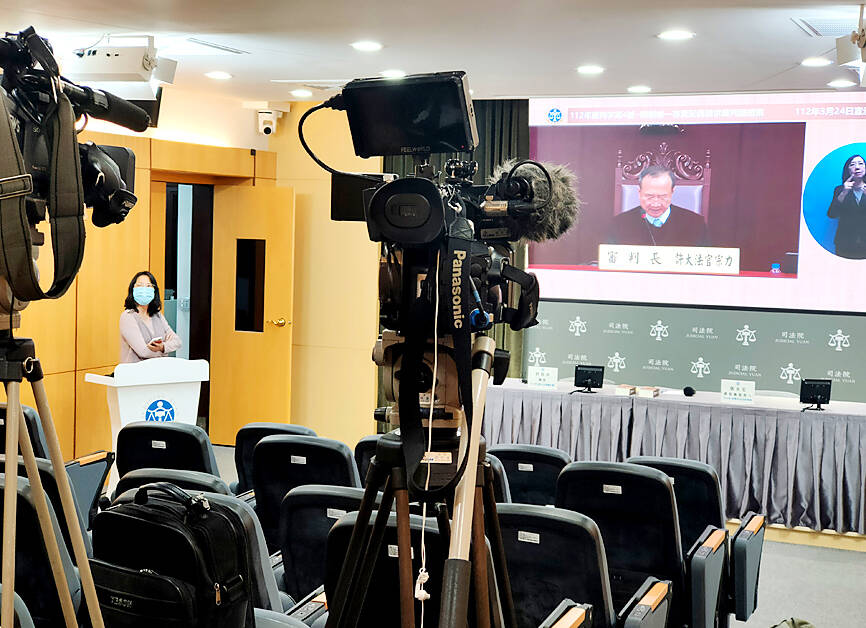The Constitutional Court yesterday said that a law barring the “responsible” party from filing for divorce is not flawed in principle, but ordered the Legislative Yuan to better define the clause and provide a statute of limitations.
Article 1,052 of the Civil Code states: “Either the husband or the wife may petition for a juridical decree of divorce ... except if either the husband or the wife is responsible for the event, only the other party may petition for the divorce.”
Kaohsiung Juvenile and Family Court Judge Chu Cheng-kun (朱政坤) and two individuals embroiled in extramarital lawsuits filed for the constitutional interpretation, claiming that the article contravened the legal principle of proportionality.

Photo: Wang Yi-sung, Taipei Times
Legal experts said on condition of anonymity that under the Civil Code, only the person who “is not” or “is less” at fault can file for divorce.
Chu and the others argued that Article 1,052 limits the constitutionally guaranteed right to freedom of marriage.
After reviewing the case, the court ruled that the proviso in principle does not contravene the Constitution’s guaranteed right of freedom of marriage.
However, it did find the blanket ban barring the party responsible for the act causing the breakdown of the marriage from filing for divorce — regardless of whether it occurred so far in the past that it has exceeded legal memory or how long it continued — might be too strict.
In this sense, the proviso contravenes the freedom of marriage under the Constitution, it said.
The court ordered competent authorities to immediately draft an amendment to the article that would bring it in line with the Constitution and implement it within two years.
Should the amendment take longer than two years to pass, all rulings after March 24, 2025, should observe the spirit of the ruling, the court said.
It suggested that legislators define the “period” after or during an act causing the irreparable breakdown of a marriage for it to be considered as such.
It also suggested that legislators observe similar cases in foreign countries and consider eligible relaxing causes to file for divorce.
The legal system should adapt to the times and make provisions so that the rights of individuals without fault and children still under their care are protected by the law during the divorce process, the ruling said.
Disagreeing with the ruling, Chu said the proviso prevents couples who have already separated in spirit from being able to separate legally.
The Ministry of Justice said the proviso protects the sanctity of marriage, as it prevents any one party from unilaterally dissolving the marriage.
Additional reporting by Wu Cheng-feng

A preclearance service to facilitate entry for people traveling to select airports in Japan would be available from Thursday next week to Feb. 25 at Taiwan Taoyuan International Airport, Taoyuan International Airport Corp (TIAC) said on Tuesday. The service was first made available to Taiwanese travelers throughout the winter vacation of 2024 and during the Lunar New Year holiday. In addition to flights to the Japanese cities of Hakodate, Asahikawa, Akita, Sendai, Niigata, Okayama, Takamatsu, Kumamoto and Kagoshima, the service would be available to travelers to Kobe and Oita. The service can be accessed by passengers of 15 flight routes operated by

GIVE AND TAKE: Blood demand continues to rise each year, while fewer young donors are available due to the nation’s falling birthrate, a doctor said Blood donors can redeem points earned from donations to obtain limited edition Formosan black bear travel mugs, the Kaohsiung Blood Center said yesterday, as it announced a goal of stocking 20,000 units of blood prior to the Lunar New Year. The last month of the lunar year is National Blood Donation Month, when local centers seek to stockpile blood for use during the Lunar New Year holiday. The blood demand in southern Taiwan — including Tainan and Kaohsiung, as well as Chiayi, Pingtung, Penghu and Taitung counties — is about 2,000 units per day, the center said. The donation campaign aims to boost

ENHANCING EFFICIENCY: The apron can accommodate 16 airplanes overnight at Taoyuan airport while work on the third runway continues, the transport minister said A new temporary overnight parking apron at Taiwan Taoyuan International Airport is to start operating on Friday next week to boost operational efficiency while the third runway is being constructed, the Ministry of Transportation and Communications said yesterday. The apron — one of the crucial projects in the construction of the third runway — can accommodate 16 aircraft overnight at the nation’s largest international airport, Minister of Transportation and Communications Chen Shih-kai (陳世凱) told reporters while inspecting the new facility yesterday morning. Aside from providing the airport operator with greater flexibility in aircraft parking during the third runway construction,

American climber Alex Honnold is to attempt a free climb of Taipei 101 today at 9am, with traffic closures around the skyscraper. To accommodate the climb attempt and filming, the Taipei Department of Transportation said traffic controls would be enforced around the Taipei 101 area. If weather conditions delay the climb, the restrictions would be pushed back to tomorrow. Traffic controls would be in place today from 7am to 11am around the Taipei 101 area, the department said. Songzhi Road would be fully closed in both directions between Songlian Road and Xinyi Road Sec 5, it said, adding that bidirectional traffic controls would